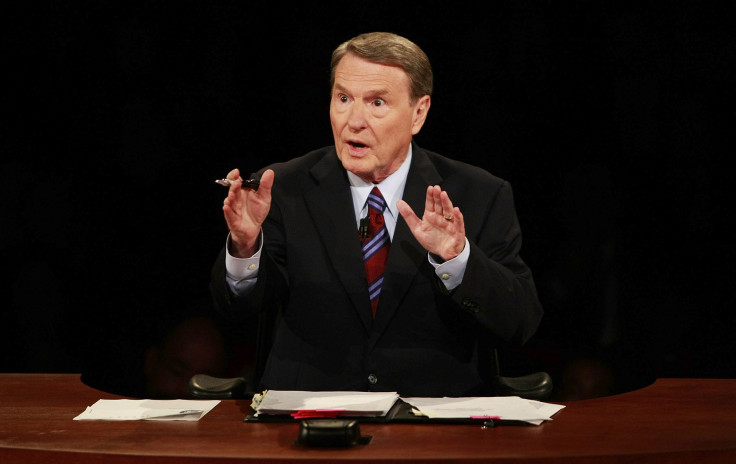2012 Presidential Debates: Is Jim Lehrer Too Liberal To Be Fair?

Jim Lehrer, the veteran PBS news host who will moderate the debate between President Barack Obama and former Gov. Mitt Romney on Wednesday night, has been dubbed the “dean of moderators.” Wednesday’s face-off -- the first of three between Obama and Romney -- will be the 12th presidential debate that Lehrer has presided over, making him more experienced at the job than anyone on the planet.
Lehrer’s colleagues have long attested to his natural moderating skills: a cool temperament, an innate sense of fairness and a keen eye for accuracy, all of which equip the 78-year-old newsman with the kind of steadfast neutrality that debate moderation requires.
“I think Jim Lehrer is always a good choice,” former CNN anchor Bernard Shaw told MSNBC in 2004. “He’s basic journalism. He’s fair. He’s balanced. He’s accurate.”
“Jim’s reputation is unassailable,” NBC’s Tom Brokaw told Politico this week. “He reeks integrity.”
Of course, this being politics, everything is assailable, and Lehrer is not without his critics, some of whom have attacked the moderator as being too liberal. Tim Graham, director of media analysis for the conservative Media Research Center, wrote on the center’s NewsBusters blog Wednesday that Lehrer, as a veteran PBS newsman, will clearly not be fair to Mitt Romney, who has stated that he would like to see an end to federal funding for PBS. “Who keeps letting these liberal public-broadcasting anchors moderate our debates?” Graham asks.
(For the record, PBS is routinely cited in national polls as America’s most-trusted news source.)
Graham isn’t the only one taking shots at Lehrer this year. Professional blowhard Rush Limbaugh, who has apparently grown tired of picking on college students, blasted Lehrer on his radio program last month, calling the moderator a “far, far-left-wing liberal Democrat.”
Lehrer, like all debate moderators, has to agree to a stringent set of rules laid out by the bipartisan Commission on Presidential Debates. The exact rules change each year, based on contract negotiations ironed out between the commission and the two major parties, and the commission does not make contracts public. That secrecy has led many media organizations to call for greater transparency in the debate process, but to no avail.
Still, many debate rules are widely known and have been consistent for decades. Lehrer will begin each segment with an opening question, and the candidates will have two minutes to respond. The moderator may use the remaining time to ask follow-up questions if necessary. The candidates, as always, are not allowed to ask each other direct questions.
Moderators do develop the debate questions, but beyond that input, Lehrer has very little ability to sway the evening in favor of either candidate. That’s because politically loaded “gotcha” questions are frowned upon and have been since 1988, when Bernard Shaw asked Michael Dukakis if the rape and murder of his wife, Kitty, would change his position on the death penalty. Many pundits at the time believed that Dukakis’ calculated and unemotional response (“No, I don't, Bernard”) cost him the debate, and perhaps the election.
Ultimately, Lehrer may be moderating the first Obama-Romney debate because he’s the only one who can. After moderating one of the debates between John McCain and Barack Obama in 2008, Lehrer had sworn off debates for good. But the Debate Commission personally reached out to him this year to ask -- beg, rather -- that he return one last time. The debate format has changed this year -- with the event now being broken up into six 15-minute segments -- and the commission said it needed a skilled moderator to launch the new format. In an interview with Politico, Lehrer likened the request to receiving a draft notice. “You have to do it,” he said.
Wednesday’s presidential debate begins at 9 p.m. EDT, and is expected to last 90 minutes. Let the zingers begin.
© Copyright IBTimes 2025. All rights reserved.






















